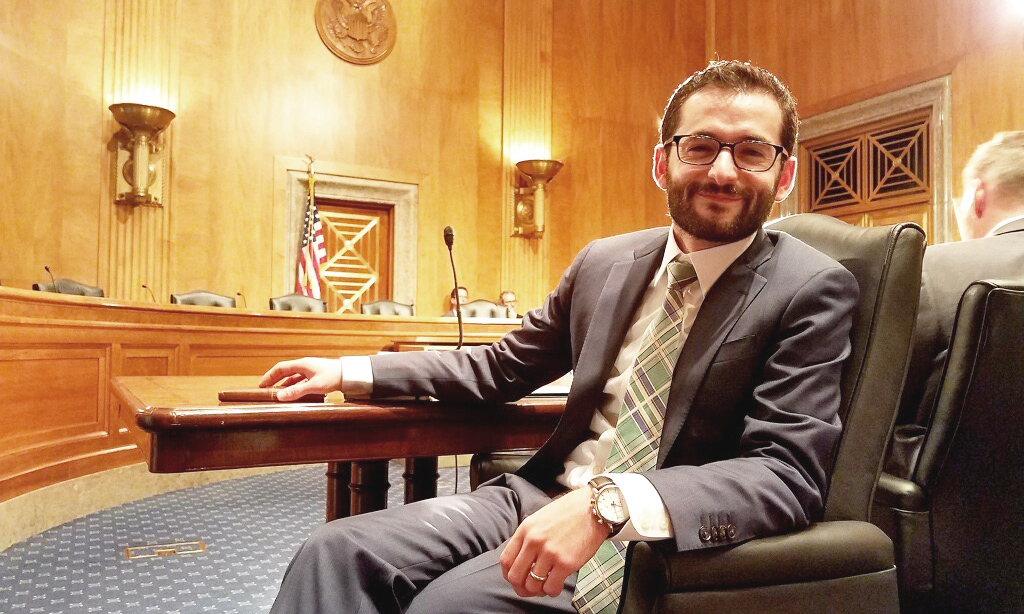Alumni, NHI News
Raul Garcia: From NHI to Saving the Planet

Because Raul Garcia works as a lobbyist, one of his National Hispanic Institute alumni friends jokes that he “practically lives in an LDZ now.”
But Garcia’s also quick to point out that he’s lobbying for communities like the one he came from. He’s putting the public policy and persuasion skills he honed as a high school student — through NHI’s Great Debate, LDZ, and CWS programs — to work for Earthjustice, a non-profit organization that helps protect communities and the environment.
“There’s a lot of lobbying done for the people who will just pay the most,” he observed of his line of work.
But he also notes that NHI’s emphasis on civic and community engagement has shaped his career—and his approach to it.
Garcia currently serves as Earthjustice’s Legislative Director for Healthy Communities in the Policy & Legislation (PAL) department.
According to the Earthjustice website, that means he’s principally concerned with protecting communities from pesticides and toxic chemicals, and he also leads Earthjustice’s team of advocates “dedicated to defending and improving federal safeguards for clean air, clean water, and against toxics exposure.”
While he didn’t set out to become an environmental lawyer, he’s been cognizant of how pollution adversely affects communities of color since growing up in Summit, Illinois. “We had some of the worst air quality in the Chicago area,” he recalled, noting that the park they spent significant time in was literally bordering a plant “spewing toxins into the air.”
Garcia shifted from immigration law to his role at Earthjustice in 2014, after noticing that some of his clients were suffering from environmental-related health issues. He learned of the position at Earthjustice, which would rely on provisions in the National Environmental Protection Act (NEPA) to engage communities in pushing back against corporations. Though his work does concern the environment, it was the opportunity to spearhead community engagement efforts that moved him to join Earthjustice.
Garcia moved to the Chicago area from Mexico City when he was 10. He started his NHI journey in 2003, as a high school student in Summit, when he was recruited to participate in what was then called the Midwest YLC. He describes the town as one that was “a little rough around the edges,” but also one that produced teams “that always walked into these things with some swagger.”
Like many Midwestern NHI students, he learned from the leadership of the late, legendary Chris Pluta, who helped numerous Summit students develop. “When we needed to do a car wash to raise money to go to a program,” he remembers, “he had me and a good friend of mine go present before the city council to get a permit. He could have easily called the mayor, come back to us, and said, ‘Yeah, we got the permit.’ But he was always teaching us. He had us go in front of the city council, telling us we had to convince them. No one’s going to deny a permit like that, of course … but he made everything like that a learning experience.”
English is Garcia’s second language, and coming into the Great Debate was a bit daunting to him initially. “I was doing well in school, but I was still struggling with the language,” he remembers. “Suddenly, you’re put into this position where that thing that you consider your weakness, you’re going to seriously work on it, day in and day out, until it becomes your strength, because you’re going to have to compete.”
He was invested enough after his 2003 Great Debate experience at Loyola University in Chicago. He stayed in Chicago for the 2004 National LDZ at DePaul University, and then traveled to Indianapolis for 2005 Midwest CWS at Butler University. He found the LDZ particularly life-changing.
“There’s this theme of deconstruction and reconstruction that each program gives you,” he explained. “The LDZ especially does that, where you learn to tear yourself apart and be honest enough with yourself to understand your strengths, your weaknesses, who you actually are as a person … where you learn to have a very honest conversation with yourself, about who you are, who you want to be, and the traits that you need to develop to be that person. And then, you slowly begin to reconstruct yourself with a new frame of mind and a new idea of yourself.”
Garcia also noted that NHI taught him “the importance of social equity and your place within a community.” He sees his work as an extension of what he learned in NHI, saying that with social equity, “you learn to build it and you learn to steer it toward your goal.” The ability to bring people together, with bettering the community as the goal, is now absolutely at the heart of what he does with Earthjustice.
“I continue to do it because there’s so much work to be done,” he reflected. He notes that when people in power decide where to put polluting highways, toxic power plants or risky petrochemical, it’s often people of color and communities of color that are adversely and disproportionately affected.
For Garcia, the importance of the work lies in “really making the connection, and then putting members of those communities most impacted at the discussion table. And then, things just flow so well. Even those elected officials that do not look like the members of those communities, they have to listen, because their stories and their members are so powerful.”
“I continue to be amazed at the power that communities on the ground command,” he declared, “and how they can use it to cause real change.”

Comments (0)